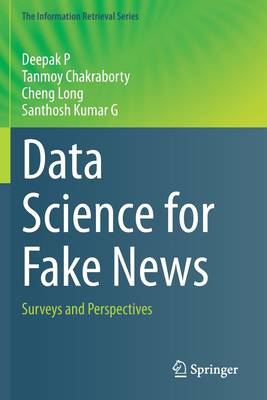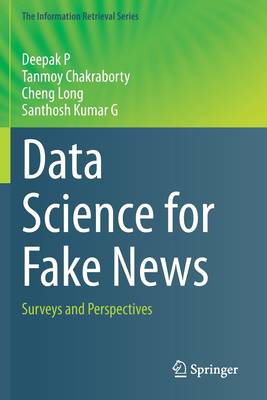
Door een staking bij bpost kan je online bestelling op dit moment iets langer onderweg zijn dan voorzien. Dringend iets nodig? Onze winkels ontvangen jou met open armen!
- Afhalen na 1 uur in een winkel met voorraad
- Gratis thuislevering in België vanaf € 30
- Ruim aanbod met 7 miljoen producten
Door een staking bij bpost kan je online bestelling op dit moment iets langer onderweg zijn dan voorzien. Dringend iets nodig? Onze winkels ontvangen jou met open armen!
- Afhalen na 1 uur in een winkel met voorraad
- Gratis thuislevering in België vanaf € 30
- Ruim aanbod met 7 miljoen producten
Zoeken
Data Science for Fake News
Surveys and Perspectives
Deepak P, Tanmoy Chakraborty, Cheng Long, Santhosh Kumar G
€ 158,45
+ 316 punten
Uitvoering
Omschrijving
This book provides an overview of fake news detection, both through a variety of tutorial-style survey articles that capture advancements in the field from various facets and in a somewhat unique direction through expert perspectives from various disciplines. The approach is based on the idea that advancing the frontier on data science approaches for fake news is an interdisciplinary effort, and that perspectives from domain experts are crucial to shape the next generation of methods and tools.
The fake news challenge cuts across a number of data science subfields such as graph analytics, mining of spatio-temporal data, information retrieval, natural language processing, computer vision and image processing, to name a few. This book will present a number of tutorial-style surveys that summarize a range of recent work in the field. In a unique feature, this book includes perspective notes from experts in disciplines such as linguistics, anthropology, medicine and politics that will help to shape the next generation of data science research in fake news.
The main target groups of this book are academic and industrial researchers working in the area of data science, and with interests in devising and applying data science technologies for fake news detection. For young researchers such as PhD students, a review of data science work on fake news is provided, equipping them with enough know-how to start engaging in research within the area. For experienced researchers, the detailed descriptions of approaches will enable them to take seasoned choices in identifying promising directions for future research.
The fake news challenge cuts across a number of data science subfields such as graph analytics, mining of spatio-temporal data, information retrieval, natural language processing, computer vision and image processing, to name a few. This book will present a number of tutorial-style surveys that summarize a range of recent work in the field. In a unique feature, this book includes perspective notes from experts in disciplines such as linguistics, anthropology, medicine and politics that will help to shape the next generation of data science research in fake news.
The main target groups of this book are academic and industrial researchers working in the area of data science, and with interests in devising and applying data science technologies for fake news detection. For young researchers such as PhD students, a review of data science work on fake news is provided, equipping them with enough know-how to start engaging in research within the area. For experienced researchers, the detailed descriptions of approaches will enable them to take seasoned choices in identifying promising directions for future research.
Specificaties
Betrokkenen
- Auteur(s):
- Uitgeverij:
Inhoud
- Aantal bladzijden:
- 302
- Taal:
- Engels
- Reeks:
- Reeksnummer:
- nr. 42
Eigenschappen
- Productcode (EAN):
- 9783030626983
- Verschijningsdatum:
- 30/04/2022
- Uitvoering:
- Paperback
- Formaat:
- Trade paperback (VS)
- Afmetingen:
- 156 mm x 234 mm
- Gewicht:
- 444 g

Alleen bij Standaard Boekhandel
+ 316 punten op je klantenkaart van Standaard Boekhandel
Beoordelingen
We publiceren alleen reviews die voldoen aan de voorwaarden voor reviews. Bekijk onze voorwaarden voor reviews.











